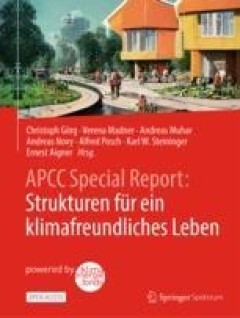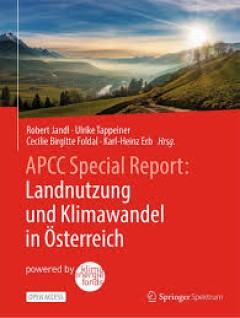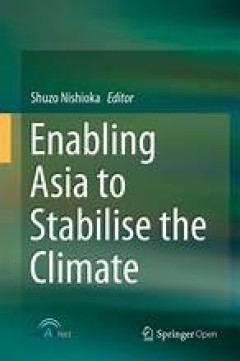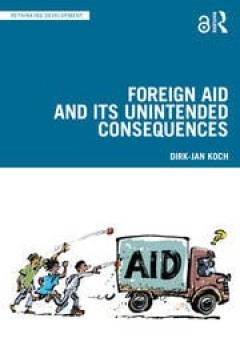Filter by

Guideline for Salinity Assessment, Mitigation and Adaptation Using Nuclear an…
This open access book is an outcome of the collaboration between the Soil and Water Management & Crop Nutrition Section, Joint FAO/IAEA Division of Nuclear Techniques in Food and Agriculture, Department of Nuclear Sciences and Applications, International Atomic Energy Agency (IAEA), Vienna, Austria, and Dr. Shabbir A Shahid, Senior Salinity Management Expert, Freelancer based in United Arab Emi…
- Edition
- 1
- ISBN/ISSN
- 9783319961903
- Collation
- XXVI, 164 hlm,: ill, lamp;
- Series Title
- -
- Call Number
- -

APCC Special Report: Strukturen für ein klimafreundliches Leben
Die Klimakrise betrifft uns alle - Doch wie kann ein klimafreundliches Leben für alle erreicht werden? Zahlreiche wissenschaftliche Sachstandsberichte bestätigen schon lange den umfassenden Handlungsbedarf, um die Klimaziele zu erreichen. Dieser betrifft alle Lebensbereiche: von Arbeit und Pflege über Wohnen bis zu Mobilität, Ernährung und Freizeit. Doch wie verwirklicht man solch eine …
- Edition
- 1
- ISBN/ISSN
- 978-3-662-66497-1
- Collation
- XX, 715
- Series Title
- -
- Call Number
- -

APCC Special Report: Landnutzung und Klimawandel in Österreich
Die Klimakrise und Landnutzung sind eng miteinander verwoben und betrifft uns alle. Die Landnutzung bietet aber ein großes PotenTial zur Bewältigung der Klimakrise. Wie können diese PotenTiale im Sinne einer nachhaltigen Entwicklung genutzt werden, die ganzheitlich die gesellschaftlichen und natürlichen Dimensionen berücksichtigt? Dies ist ein Open-Access-Buch. Landökosysteme erbring…
- Edition
- -
- ISBN/ISSN
- 9783662678640
- Collation
- VIII, 528
- Series Title
- -
- Call Number
- -

Inorganic Constituents in Soil
This open access book is a must-read for students of and beginners in soil science. In a well-organized and easy-to-follow manner, it provides basic outlines of soil minerals, new methods and recent developments in the field, with a special focus on visual aids. The chapters on primary minerals, secondary minerals, non-crystalline inorganic constituents and inorganic constituents sensitive t…
- Edition
- 1
- ISBN/ISSN
- 9789811312144
- Collation
- xi, 181 hlm,: ill, lamp; 21 cm
- Series Title
- -
- Call Number
- -

Earthquakes, Tsunamis and Nuclear Risks
This book covers seismic probabilistic risk assessment (S-PRA) and related studies which have become more important to increase the safety of nuclear facilities against earthquakes and tsunamis in the face of the many uncertainties after the Fukushima accident. The topics are (1) Active faults and active tectonics important for seismic hazard assessment of nuclear facilities,(2) Seismic source …
- Edition
- 1
- ISBN/ISSN
- 978-4-431-55822-4
- Collation
- -
- Series Title
- -
- Call Number
- XII, 177

Enabling Asia to Stabilise the Climate
This book presents good practices in Asia and ASEAN countries for effectively promoting advances in response to climate change, which can help to achieve sustainable development in Asia and around the world. As a proposal, the aim is to influence the discussions at COP 21 by providing a positive agenda with concrete actions from an Asian perspective. The book is divided into three parts. Part 1…
- Edition
- 1
- ISBN/ISSN
- 978-981-287-826-7
- Collation
- -
- Series Title
- -
- Call Number
- X, 270

Case Studies in Biocultural Diversity from Southeast Asia
This open access book demonstrates the linkages between local languages, traditional knowledge, and biodiversity at the landscape level in Asia, providing a fresh approach to discussions on Asia’s biocultural diversity. The book carries forward earlier analyses but importantly focuses on ‘traditional ecological calendars,’ ‘folk medicine,’ and ‘folk names’ in the context of the vi…
- Edition
- 1
- ISBN/ISSN
- 978-981-16-6719-0
- Collation
- -
- Series Title
- Asia in Transition
- Call Number
- XIX, 260

Economics of Land Degradation and Improvement – A Global Assessment for Sus…
This volume deals with land degradation, which is occurring in almost all terrestrial biomes and agro-ecologies, in both low and high income countries and is stretching to about 30% of the total global land area. About three billion people reside in these degraded lands. However, the impact of land degradation is especially severe on livelihoods of the poor who heavily depend on natural resourc…
- Edition
- 1
- ISBN/ISSN
- 978-3-319-19168-3
- Collation
- -
- Series Title
- XVIII, 686
- Call Number
- 330

Foreign Aid and its Unintended Consequences
Foreign aid and international development frequently bring with it a range of unintended consequences, both negative and positive. This book delves into these consequences, providing a fresh and comprehensive guide to understanding and addressing them. The book starts by laying out a theoretical framework based on complexity thinking, before going on to explore the ten most prevalent kinds o…
- Edition
- 1st Edition
- ISBN/ISSN
- 9781003356851
- Collation
- 236
- Series Title
- -
- Call Number
- -

Sterile Insect Technique : Principles And Practice In Area-Wide Integrated Pe…
The sterile insect technique (SIT) is an environment-friendly method of pest control that integrates well into area-wide integrated pest management (AW-IPM) programmes. This book takes a generic, thematic, comprehensive, and global approach in describing the principles and practice of the SIT. The strengths and weaknesses, and successes and failures, of the SIT are evaluated openly and fairly f…
- Edition
- -
- ISBN/ISSN
- 9781003035572
- Collation
- -
- Series Title
- -
- Call Number
- -
 Computer Science, Information & General Works
Computer Science, Information & General Works  Philosophy & Psychology
Philosophy & Psychology  Religion
Religion  Social Sciences
Social Sciences  Language
Language  Pure Science
Pure Science  Applied Sciences
Applied Sciences  Art & Recreation
Art & Recreation  Literature
Literature  History & Geography
History & Geography